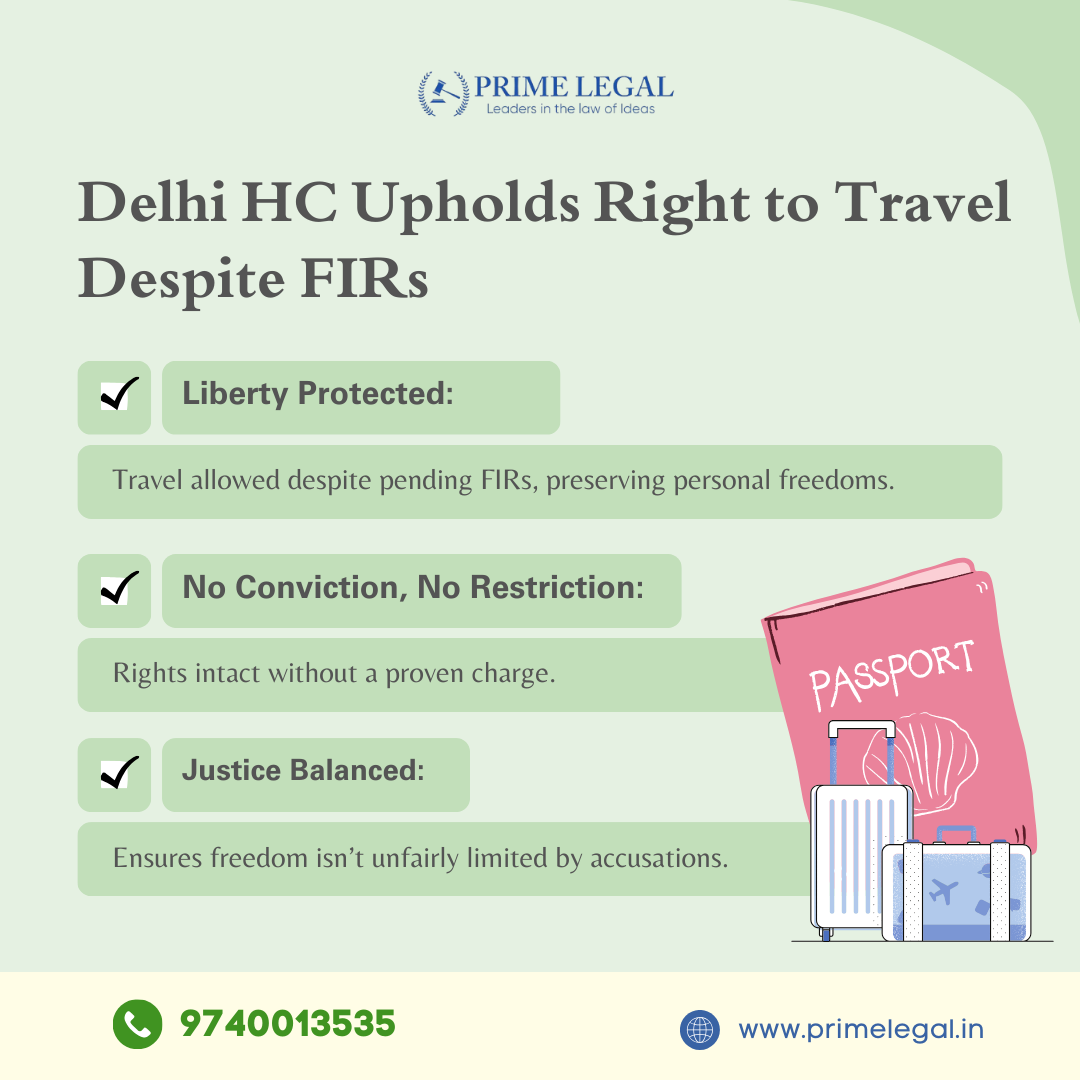INTRODUCTION:
The Delhi High Court recently upheld the right to long-term travel abroad, adding that such travel cannot be denied solely due to the existence of pending FIRs. The decision came in response to a petition filed by Amardeep Singh Bedi, who was denied a Police Clearance Certificate (PCC) based on two FIRs lodged against him. The court emphasized that it is unreasonable to limit movement based only on open cases without the conviction of the person and violates an individual’s fundamental rights.
BACKGROUND:
The case revolves around a writ petition filed by Amardeep Singh Bedi, who sought to obtain a Police Clearance Certificate (PCC) to apply for the Start-up Visa Programme in Canada.
However, Bedi faced challenges in acquiring the PCC due to two pending FIRs filed by the Enforcement Officers of the Employees’ Provident Fund Organization (EPFO). The FIRs alleged that the accused had deducted the provident fund contributions from employees’ wages without depositing them as required by law. Despite a quasi-judicial inquiry under Section 7A of the EPF Act, which led to Bedi depositing Rs. 7,485,753, he was still denied the PCC.
KEY ASPECTS:
- Petitioner’s Contention:
As the counsel of the petitioner, Advocate Rajiv Arora contended that as the PCC is denied to Bedi he is unable to apply for Canadian Start-up Visa Programme for setting up a new business venture.
Advocate Rajiv Arora also informed the bench that after the FIRs were registered, a quasi-judicial inquiry was conducted under Section 7A of the Employees’ Provident Funds and Miscellaneous Provisions Act (EPF) Act. And that Bedi had already complied with the EPF authorities’ order by depositing INR 7,485,753, , indicating his willingness to address the allegations.
- Opposition by the State:
As the counsel of the respondent, Advocate Farman Ali opposed the grant of a PCC to the petitioner for Canada, stating that the police authority submitted an ‘adverse’ report against the petitioner.
While acknowledging the said adverse report, the court noted that the petitioner’s passport was renewed in 2019 for a decade, indicating that the passport authorities found no reason at that time to deny him travel privileges.
- Court’s ruling on Travel Restrictions:
The Delhi High Court ruled that ‘long-term travel abroad cannot be denied solely on the grounds of pending FIRs without any conviction or guilt’. The court here pointed out to the fact that such restrictions are ‘unreasonable’ and that it would be unfair to impose such ‘blanket restrictions’ and that cannot be put based on the FIRs alone.
The bench, in the present case led by Justice Sanjeev Narula also highlighted that a Police Clearance Certificate (PCC) must ensure transparency about an individual’s background instead of restricting travels based on pending cases.
The court stated, “The petitioner’s (Amardeep Singh Bedi) right to work and freedom of movement must not be unjustly restricted solely on the existence of these FIRs.”
- Court’s Directive and Rationale:
The court directed the issuance of a PCC to the petitioner within two weeks, on the condition that it explicitly mentions the pending criminal case against him and that he has complied with the RPFC’s order by making the required deposit. The court stressed that this would ensure transparency for the Canadian authorities during their visa assessment.
CONCLUSION
The Delhi High Court’s decision reflects the principle that it is unjust to deprive an individual of his fundamental rights, like the right to travel, based on pending criminal cases against that individual without conviction. Therefore, the court managed to balance the right to a fair trial and transparent procedure on one hand by granting a PCC with a clear mention of the pending FIRs, thus, ensuring that the authorities could make rational decisions while at the same time, protecting the petitioner’s right to work and the right of freedom of movement on the other.
This ruling shows the court’s stand on ensuring that legal issues relating to travel restrictions and other legal cases still pending in court are made and sustained to be fair and consistent.
“PRIME LEGAL is a full-service law firm that has won a National Award and has more than 20 years of experience in an array of sectors and practice areas. Prime legal fall into a category of best law firm, best lawyer, best family lawyer, best divorce lawyer, best divorce law firm, best criminal lawyer, best criminal law firm, best consumer lawyer, best civil lawyer.”
WRITTEN BY- TEJASRI RAO


